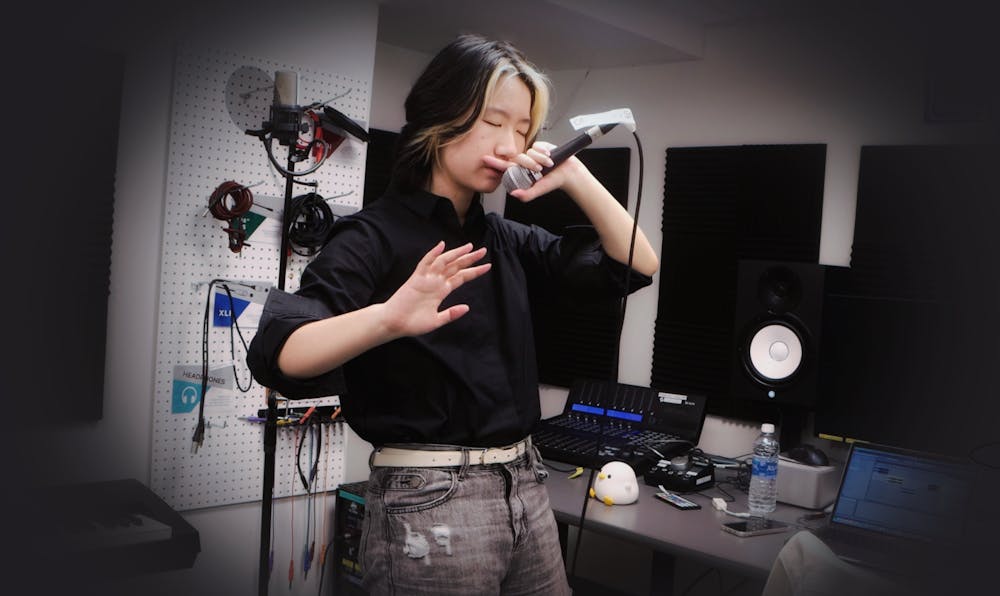
Growing up, I was always the "kid who stutters." My words would stumble out in broken rhythms, leaving me anxious to speak in public. Conversations felt like minefields — my mind raced ahead, but my mouth couldn’t keep up. I’d shrink back, avoid eye contact and dodge any situation where I’d need to talk for long.
In those early years, I didn’t feel like my voice had a place in the world. I was constantly trapped by the fear of hitting my stutter.
By sheer accident, while I was scrolling through music one day, I stumbled onto something that changed my world: rap. I wasn’t even searching for it, but when I first heard it, I was hit by a flood of rhythm, rhyme and flow that seemed to defy the rules of normal speech. What struck me wasn’t just the sound but how effortlessly these artists played with words, moving faster than anyone I’d ever heard, without stumbling or hesitating.
I started quietly mimicking the rap lyrics. To my surprise, the stutter didn’t show up. In fact, I could keep up with the fast beats in a way I never thought was possible. I realized that whenever I added the rhyme and flow to my speech, the stutter would mysteriously dissolve.
There was something about the structure of rap (its rhythm and cadence) that allowed me to speak fluidly, even rapidly. It felt like I had found a loophole in my speech disorder. From then on, I dove into the world of rap. For me, it wasn’t just a hobby but a safe space where I could express myself freely without letting self-consciousness trip up my speech.
As I grew older, my passion for rap music turned into something even deeper. Rap wasn’t only about overcoming my stutter anymore. It became my go-to outlet for emotions I’d been quietly carrying for years. With a beat behind me, I could finally express the nervousness and the frustration of trying to fit in when staying silent. I began writing my own lyrics — sometimes fiery, sometimes a little sad and sometimes just bursting with energy. It turned into a whole new language for me — a form of therapy that helped me let go of everything I was feeling, without feeling too vulnerable.
Rap became my way of stepping out of the boundaries I had set for myself and turning what once felt like a weakness into a source of strength. The more I rapped, the more confident I became — not just in music, but in every part of my life. Rap was the bridge that helped me make peace with my nervous tendencies, allowing me to explore who I was beyond the rigid world of school and academics.
Music carried me through some of my hardest moments — when I was facing bouts of anxiety and coping with depression. It was there when a regular conversation fell short of expressing the weight of my emotions. Through rap, I discovered a way to release that heaviness, to share pieces of myself with family, friends and even strangers. What started as a personal refuge blossomed into something that connected me to others.
Rap didn’t just help me express myself; it shaped my identity. It taught me that imperfection isn’t a limitation but something I can embrace and turn into strength. Accepting my stutter wasn’t easy, but rap showed me that problems and solutions are connected and that through that connection, I could grow.
Rap also taught me to approach life’s challenges more creatively. I stopped viewing my stutter as something to overcome and started seeing it as part of my voice, giving me a unique perspective on problem-solving and self-expression. Each time I rap, I embrace the pauses, the nervousness, the flaws and turn them into power.
This journey of acceptance has reshaped how I see life. I no longer view problems and solutions as opposites but as parts of the same process. Rap transformed my stutter from an insecurity into a powerful tool for creativity. It’s been with me through my toughest moments, opening doors I never imagined. Now, it’s an integral part of who I am — a testament to the power of music and human resilience.
Kaiyuan Du is a junior from Beijing, China studying Molecular and Cell Biology.





